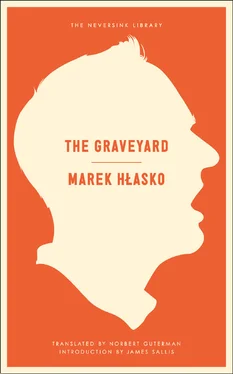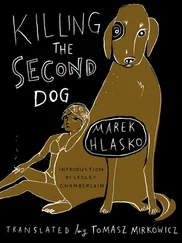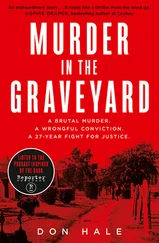“You didn’t tell him?”
“I’ll tell him when the time comes.”
“You can tell him now. You’ve got to.”
She shook her head. “I’m afraid to,” she said. “He might want me to — he’s sick, he’ll be afraid. I’ll tell him after it’s …” She stopped.
“Why?” Franciszek whispered.
“I want them to live, both of them.”
Franciszek turned away; Elzbieta walked quietly out of the room, carrying the dish. He drummed his fingers on the windowpane. On the floor above, someone was torturing a piano; the fingers of the invisible player kept stumbling on the same key. In the street a man with a long pole passed, lighting the lamps; the gleam of a newly lit lamp and the false note on the floor above came almost simultaneously.
“You look like an Italian woman praying to God and waiting for her husband. They stand by the window for hours, exactly as you’re doing now.”
He turned. “Did you buy a newspaper, Mikołaj?”
“Yes.”
“Are you going somewhere tonight?”
“Have you something to tell me?”
“Yes.”
“Just a minute, I want to wash my hands.”
Mikołaj left the room. He was dangerously handsome; his face, voice, silhouette, the gleam in his eyes, his smile or grimace, his animal gait, his calm sleep, the manner in which he flipped away a cigarette butt — everything nature had given him was like a constant humiliation to others, a summons to hide their faces, to keep offstage, to stop talking, smiling, and breathing loudly. After a moment he came back and sat opposite Franciszek.
“Listen, Mikołaj,” Franciszek said. “I’ve been expelled from the party.”
“Are you drunk?”
“I’m sober. I haven’t touched a drink.”
“Then don’t talk that way.”
“It happened yesterday. I did something I can’t understand. It seems like a nightmare. But it’s a fact.”
Mikołaj walked up to him and looked him in the eyes. Franciszek drew back, hunching up a little: his son was staring at him as if he were some strange thing. They were silent; Elzbieta was clattering dishes in the kitchen.
Mikołaj said at last: “Why?”
“It’s my fault.”
“What did you do?”
“Listen: I met a friend I hadn’t seen since the days of the underground. We drank a few drinks. Then the police stopped me — two hard-boiled kids. I began to talk back to them — I was sober, damn it, suddenly quite sober; and they badgered me, they wanted to take me to the police station. In the end I flew into a rage, and I shouted things I can’t remember. Next morning they told me what I had shouted, Mikołaj; I shouted that they could stick everything — you understand, everything — somewhere; that I didn’t believe in anything; and I insulted the party, and …” He suddenly fell silent.
“Well?”
“Mikołaj, the fact is I don’t think that way; you know it. I’ve never thought that way. I can’t understand it.”
“Then why did you shout?” Mikołaj asked tonelessly.
“I don’t know. That’s the worst of it.”
“What happened then?”
“I wanted to get the matter cleared up right away. But I failed. That is to say, I was expelled. They have a record at the police station, you understand. Everything is written down, every word. There can’t be any mistake. I must really have shouted those things.”
“That means you think them.”
“Mikołaj,” Franciszek said imploringly, “surely you know me as well as a son can know a father. You have no right to speak like that.”
“We aren’t talking as father and son,” Mikołaj said.
“No? As what, then?”
“As party comrade to party comrade.”
“I don’t think that way,” he whispered. “You know I don’t.”
“You speak that way. You shout that way. Were you sober?”
“Yes.”
“Are you sure?”
“As sure as I’m here. Maybe a bit edgy.”
“So at other times — when you are sober as you are now — you also say things you don’t feel?”
“No, no.”
“And then what?”
“I don’t understand. I don’t understand it myself. Maybe it’s a mistake?”
“Haven’t you checked?”
“I have,” Franciszek whispered. He passed his hand over his forehead. “In the morning when I was released they told me. And our secretary, too, checked … No, it’s not a mistake. I must really have insulted the party.”
“Yes, you must have.”
“And I don’t understand it.”
“That you shouted?”
“It’s a vicious circle of some kind. I shouted something I don’t feel.”
“And when you shout, ‘Long live socialism, the party, Stalin,’ don’t you feel it either?”
“How can you?”
“How could you?”
“Mikołaj …”
Mikołaj got up. “There’s no Mikołaj … You’ve been expelled from the party, haven’t you?”
“Yes.”
“For duplicity, yes?”
“Yes.”
“Who is right — you or the party?”
“I.”
“And who shouted?”
“I.”
“So you weren’t right. Whom shall I believe — you, an individual, you who shout something you don’t feel, something you can’t account for — or the party?”
“We must believe the party,” Franciszek whispered.
“If that’s so, we can’t stay together,” Mikołaj said.
“You want to leave home?”
Mikołaj did not reply. An hour went by. Franciszek watched Mikołaj pack his things in a valise — a modest suit of clothes, books, cheap shirts.
“You’re really going,” Franciszek said. He was silent a long while, then he added: “Who knows, maybe I’d do the same thing in your place.”
“I’ll come back after you’ve cleared yourself.”
“What am I to do?”
“Stand up and fight. Maybe you’ll find somebody, some comrades, who’ll believe you and be able to settle things for you. I’ve got to believe the party.”
“And not me? I am your father; in spite of everything I am your father, whether you like it or not … Can’t you believe me?”
Mikołaj was already in his overcoat. He walked to the window; the light of the street lamp glinted in his hair.
“Believe — you? You alone? No.” He turned round violently. “What do you know about the world, about how vile it is? You’re still living in the past, in the underground — don’t you realize what is going on today? Don’t you really understand anything?” Once again he stared into the street. “If they tore the fronts off the houses, we’d see pigsties. I can’t afford to believe any individual. I can only believe the party. If I didn’t have the party to look up to, I’d become the vilest of the vile. I couldn’t live otherwise. And you want me to believe you, you of all people — a shouter and a liar?”
“I am your father!” Franciszek cried.
Mikołaj smiled gloomily. “You are Franciszek Kowalski, expelled from the party for duplicity. The rest is beside the point, an accident. If the party takes you back, I’ll apologize to you.”
He picked up his valise. “Goodbye.”
“Goodbye,” Franciszek said after him. He stood by the window; he saw Mikołaj leave the house, and walk resolutely down the street. Then his son disappeared around a corner. Again trams, autos went by; over the slippery pavement, when it was empty for a moment, spread the red glow of the neon sign: YOUNG PEOPLE READ … —the only glow above the thick darkness of the city.
THE STREET CAME ABRUPTLY TO AN END, AND Franciszek stopped. Farther on there were fields, dilapidated wooden buildings, unkempt yards, and smoking piles of rubbish; in the fields wrecked cars protruded from under the thawing snow; the sun setting behind the distant city walls gleamed red on their rusty bodies. Franciszek looked about him helplessly — he had never before been in this section. Finally he stopped a passer-by. “I beg your pardon; can you direct me to Acacia Street?”
Читать дальше






![Ричард Деминг - Whistle Past the Graveyard [= Give the Girl a Gun]](/books/412176/richard-deming-whistle-past-the-graveyard-give-t-thumb.webp)


